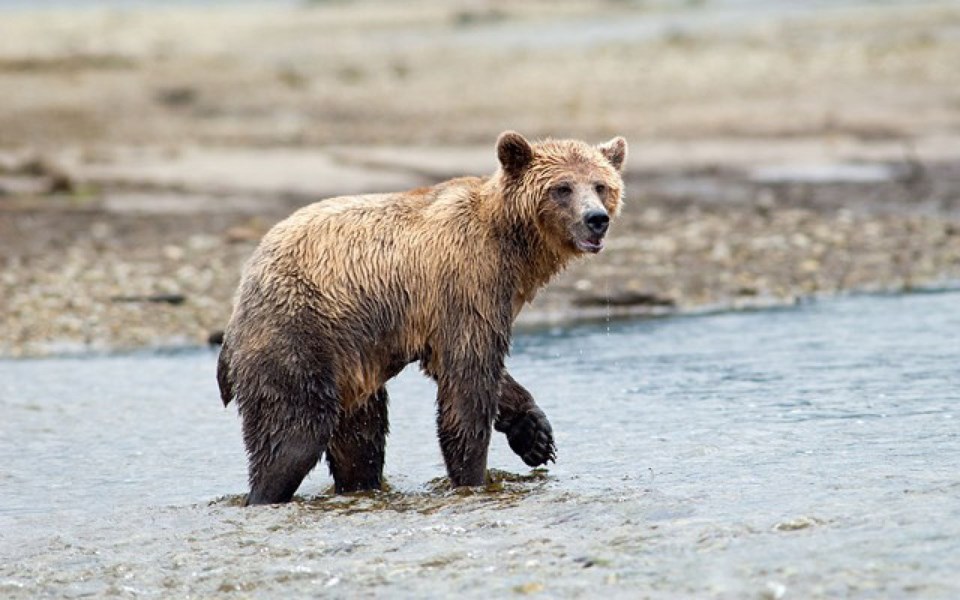BANFF, Alta. – By 2080, warming temperatures may cause buffaloberries to ripen three weeks earlier than they do now in Alberta's Bow Valley. At higher elevations of Banff National Park, the earlier ripening could come 40 days earlier, according to a study by a University of Calgary researcher.
That change could make life more difficult for grizzly bears, researcher David Laskin told the Rocky Mountain Outlook.
"The buffaloberry crop ... is a critical buffet for the bears late in the season, and it's an opportunity for them to gain a lot of weight before hibernation," he said.
A male grizzly can eat up to 220,000 berries in a single day.
"Their ability to reproduce relies on how much weight they can put on in summer. There's going to be a bigger gap between when bears eat berries and when they hibernate, and that may compromise their ability to gain weight."
That could have implications, he adds for human-bear conflicts.
Best not to play football with those Nerf thingees
FRISCO, Colo. – Scattered around Colorado's high country above highways after this winter of deep snows lie 22 explosives coloured yellow, orange, and blue, all of them shaped like mini-torpedoes. The Summit Daily News says they also resemble Nerf footballs.
The Colorado Department (C-DOT) of Transportation put 1,569 explosives into avalanche paths, using Avalaunchers and other devices, to trigger slides when nobody was below. Helicopters were also used to drop charges. This is 10 times the number of charges from last winter, which had relatively sparse snow in Colorado. Only 1.4 per cent of the total explosives failed to detonate.
Tracy Trulove, a spokeswoman for C-DOT, tells the Summit Daily that the agency has 70 trained individuals who will try to locate the explosives. Just the same, there could be some things that look like Nerf footballs lying about. It's best to not fiddle with them.
Questions about technology as phone coverage expands
JACKSON, Wyo. – The National Park Service favours adding 13 cell towers to supplement the two existing towers in Grand Teton National Park. Whether this is good is being debated.
The intent, say park officials, is to improve reception in the front-country portion of the park. They acknowledge a small increment of new telephone reception in backcountry areas.
Even a small increment doesn't sit well with Jim Stanford, boatman on the Snake River and a Jackson town councillor. "Are we losing something here?" he asks the Jackson Hole News&Guide rhetorically. "Are these places becoming less wild for the sake of modern convenience?"
Franz Camenzind, a well-known conservationist, also has reservations. "Providing extensive coverage to the general public, I don't think it's their responsibility. I think it's contrary to the value that natural areas and national parks can provide to the public."
The new coverage will not be comprehensive, says Rusty Mizelle, but he had advice for those bothered by the coverage: "Turn your cellphone off."
Cellphone service has already fundamentally altered rescue operations during the last decade, says Cody Lockhart, of the Teton County Search and Rescue. First responders now initially use cellphone forensics to determine locations.
"A decade ago, most of our incidents started out as a search, and then became a rescue," he said. This shift has "definitely saved lives."
Dumpster-diving bear with taste for honey pays price
STEAMBOAT SPRINGS, Colo. – The blond-haired black bear first attracted attention in Steamboat Springs for its dumpster-diving. But when it started hanging around a daycare centre, state wildlife officials knew that the bear had to go.
But to where? In this case, the bear was captured and then released to a ranch about 50 miles from Steamboat, in the pinyon-and-juniper country near Meeker, in northwest Colorado. But the bear got into trouble there, going after honey in a bee farmer's hive. That earned the two-year-old a death sentence.
Kris Middledorf, a wildlife manager for Colorado, told the Steamboat Pilot & Today that when bears cause agricultural damage, they must be killed, because the state must compensate the farmers and ranchers for their losses. It quickly becomes expensive.
The Department of Parks and Wildlife has sometimes provided electric fencing, to keep the bears out of the apiaries. But there are just too many new apiaries in that area during the last 10 years, he said.
Last year, 18 bears were relocated in northwestern Colorado, of which eight were subsequently killed because they got into trouble a second time.




